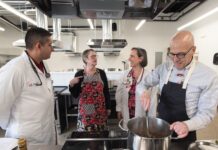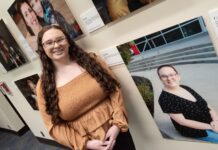
If you live in Louisville, it’s hard to be unaware of the Kentucky Derby and the visitors it attracts to the city. But not all the visitors arrive with good intentions, so victim advocates are calling for increased awareness of human trafficking during the large-scale events this season.
Kentucky Attorney General Andy Beshear joined a UofL social work researcher, survivors and other advocates at the Survivors’ Corner nonprofit office recently to entreat the public to watch for signs of criminals who exploit victims for sex and to report their activities to protect their traumatized victims, who often are minors.
Jennifer Middleton, Kent School of Social Work associate professor and director of the Human Trafficking Research Initiative, shared research findings from Project Pivot (Prevention and Intervention for Victims of Trafficking), funded through a grant from the Kentucky Children’s Justice Act Task Force.
Analyzing 2013-2018 data from the Kentucky Department for Community-Based Services, the research team has preliminary results indicating 83% of the 698 alleged child-trafficking victims reported to the department were female, with the most commonly reported age of 16. Victims ranged from 2 weeks old to 17 years.
“Alarmingly, the majority (57%) were trafficked by a family member, often a biological parent,” Middleton said.
The Project Pivot research echoes some findings from previous research showing that homelessness, youth and adversity are factors that make children vulnerable to being trafficked and “serves as a call to action to our community and our state,” she said.
“However, despite the weight of these statistics, there is hope,” Middleton said. “By ramping up community education and awareness efforts and educating the community about the warning signs of human trafficking and what to look for, community members, parents, educators and first responders can help prevent child trafficking from occurring.”
Her team in this project includes research assistants Emily Edwards, a counseling psychology graduate student in the College of Education and Human Development, and Rianna Ayala, a graduate student in the Kent School of Social Work.
“It’s going to be impactful,” Ayala said.
Project Pivot aims to increase awareness of child trafficking in the state and to improve the ability of various systems to respond to victims in a manner that limits additional trauma to the children. The group should wrap up its report with data and focus-group findings by July and work with a local human trafficking task force and others to prioritize policy and practice recommendations.
When addressing issues such as trafficking, it’s important to understand the root causes, which is why research is important, said Beshear, who has made the fight against human trafficking a core mission of his office.
“The work out of the Kent School helps us do our job better. Jennifer (Middleton) is a warrior. We view her and the Kent School as partners,” he said.
Survivor Summer Dickerson, founder of Women of the Well support ministry, told people at the April 22 news conference that four years ago she spent time at the track’s Millionaires Row after being flown in to be trafficked during Derby season.
“Four years ago I was being sold on Derby and Oaks. Now I’m part of the solution,” Dickerson said. “Please be aware it is happening. It’s happening everywhere.”
To help recognize the signs of human trafficking and ways to report it, check this online poster.






























